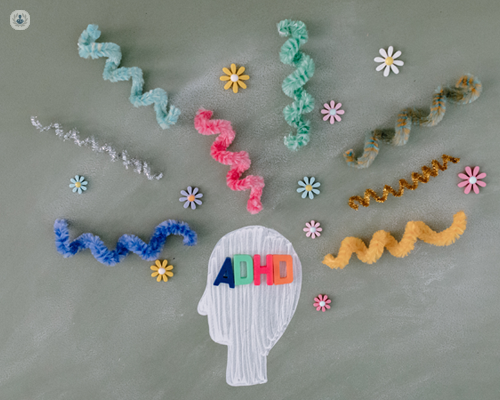A comprehensive guide to ADHD
Autore:Diagnosis of ADHD appears to be on the rise. In the United Kingdom, it's estimated that ADHD affects around 3% to 4% of adults, with a male-to-female ratio of approximately 3:1. Leading consultant psychiatrist Dr Madeline Kerr explains the symptoms, diagnosis and treatment of ADHD.

What are the symptoms of ADHD?
Broadley, ADHD symptoms fall into two categories: attentional/inattentional and hyperactivity/impulsivity. Nine key areas are examined within each category, with additional signs considered during interviews.
Inattentional symptoms include distractibility, difficulty initiating tasks, and forgetfulness. Hyperactivity/impulsivity symptoms manifest as impulsiveness, restlessness, and impatience. While traditionally associated with physical activity, hyperactivity can manifest internally, leading to impulsivity in speech and behaviour. These symptoms may vary in presentation and can be masked or suppressed, causing potential embarrassment for individuals with ADHD.
How is ADHD diagnosed?
ADHD diagnosis involves conducting interviews with individuals who suspect that they may have the condition, as well as gathering collateral information from others who know them. This could include current acquaintances, but insights from childhood are particularly valuable since ADHD typically manifests early on and can impact academic performance.
Obtaining input from parents or reviewing old school reports can provide crucial context. Relying on external sources is vital because ADHD may lead to memory gaps and difficulty in forming memories due to sleep disturbances. Therefore, interviews aim to explore the lifelong effects of symptoms, incorporating perspectives from various sources.
What are the treatment options available for ADHD?
When dealing with ADHD, there are various approaches to consider. While medication is commonly associated with ADHD treatment and can be highly effective, it's important not to overlook other strategies. Starting with medication can help to alleviate symptoms, enabling individuals to better focus and assess their situation. This sets the stage for implementing additional strategies. These may include seeking formal ADHD coaching to identify helpful techniques, engaging with online forums or podcasts to learn from others' experiences, and making small daily adjustments such as establishing routines, which can significantly enhance feelings of success.
Ultimately, the treatment approach may encompass a combination of medication, practical strategies, coaching, and perhaps psychological interventions to address specific challenges.
How does ADHD impact daily life and relationships?
ADHD manifests in various ways and can vary in severity, but it typically affects many aspects of daily life. Particularly in professional settings, challenges with organisation can lead to tardiness, forgetfulness, or difficulty initiating tasks, impacting work performance. Individuals with ADHD may develop a reputation for being disorganised or unreliable, despite their sincere intentions to fulfill responsibilities.
This misrepresentation can be disheartening, as those with ADHD are fully aware of their obligations but struggle with execution. Consequently, work may feel less fulfilling, and individuals may perceive themselves as lagging behind their peers.
In relationships, the impulsivity associated with ADHD can lead to rapid shifts in emotions. Mood swings, from joy to frustration or sadness, can occur suddenly, posing challenges within interpersonal dynamics. Successful navigation often hinges on the understanding and support of partners, as well as self-awareness and coping strategies to manage overwhelming situations.
Are there any coping strategies or lifestyle changes that can help manage ADHD symptoms?
There are many solutions to explore depending on your primary challenges. For example, if organisation is a great challenge, individuals might prefer a traditional paper calendar or opt for a centralised online calendar. Recognising personal tendencies, such as getting sidetracked by household chores, allows for pre-emptive measures like scheduling buffer time before appointments.
Strategic planning and self-awareness can significantly enhance productivity throughout the day. Regarding emotional coping mechanisms, simply understanding that fluctuations in mood are often attributed to ADHD rather than personal shortcomings can be immensely comforting.
Adapting to individual circumstances is key. For instance, incorporating more frequent breaks between tasks, scheduling buffer periods, and utilising written reminders can help concentration. Ultimately, it's about tailoring strategies to suit individual needs and preferences.
If you would like to book a consultation with Dr Kerr, simply visit her Top Doctors profile today.


